The habit among ballet critics of being simultaneously down on John Cranko's 1965 Onegin and up on Kenneth MacMillan's 1974 Manon is a curious one. The two have many similarities, from their basis in novels that became operas (though Prévost's Manon Lescaut antedates Pushkin's verse Eugene Onegin by a century), through their patched-together scores that don't actually use the Massenet/Tchaikovsky operas, to the knotty questions of morality and culpability that attend their titular characters. Perhaps it's because the London public eventually got used enough to MacMillan to decide he was a genius, whereas Cranko isn't performed much here, and died too soon to create the mature works that made MacMillan's reputation, but I'm not sure the contrast is terribly fair to Onegin.
But Manon has all those showy pas de deux, I hear you cry – can Onegin match those? It has its pas de deux but they compare in neither number nor showiness, I'll admit – and that's the point. Manon works by displaying all its characters' passions: we sympathise with them because we get swept up in their experiences, and their bad decisions make sense to us because we feel the heat of the moment in which the decision is made.
Onegin, by contrast and like its source, is the ballet of the inscrutable motivation. Why do Onegin and Tatiana do what they do? Straightforward Romantic reasons – love, honour, sacrifice – won't cut it: neither of these characters is pure enough, and Onegin in particular makes a couple of calls – humiliating Tatiana, provoking and then killing his friend in a duel – that look like nothing so much as sheer bad character. Tatiana and Onegin are both creatures of darkness, moon- and lamplight, and even if you peel back the curtains and drapes that cover their main scenes, you won't be able to see very far. Look at Jürgen Rose's set: there are no windows, and there's no definitive illumination of either character. But that's why I find Onegin rather fascinating: it's novelistic, not simplistic, and offers wonderful opportunities for principal dancers to introduce different characterisations
Thiago Soares, for example, is a nice chap, and his interpretation of the role casts a better light on Onegin than the character perhaps deserves. Through a certain stiffness of shoulder and correctness of bow, Soares manages to suggest that Onegin's consistently rude behaviour (ostentatiously playing Patience at a birthday dance for heaven's sake!) derives at least partly from awkwardness. We feel genuinely sorry for him in Act III too, where his spirit seems crushed by regret even before he realises who Tatiana is.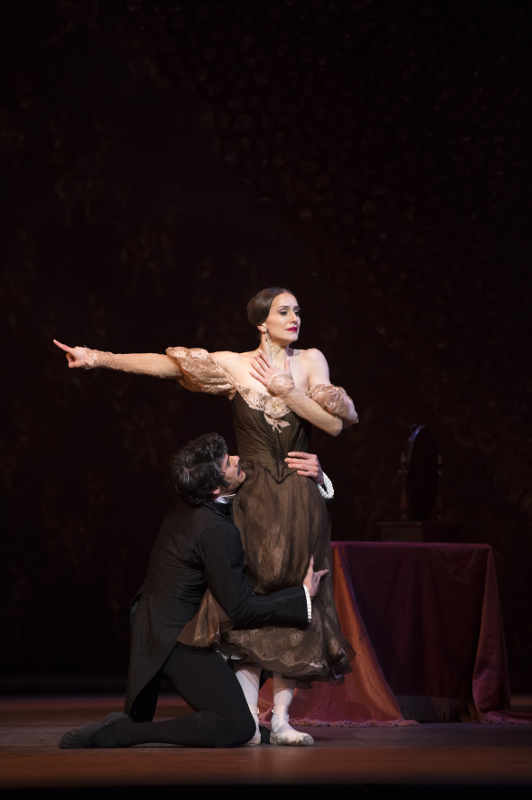 I like Marianela Nuñez as Tatiana. She plays her very plain and awkward in the first act, foregrounding an emotional immaturity that makes the famous mirror pas de deux, in which a dream Onegin fulfils all her fantasies, seem rather creepy, the product of an unhealthily overheated adolescent imagination. But Nuñez preserves Tatiana's sweetness and strength of character too, and her Act II Scene I variation, in which she tries to catch Onegin's attention, is a delicate masterpiece of characterisation; Tatiana may be showing off to a man who isn't interested, but Nuñez executes her steps with a crispness and verve that show Tatiana is no pushover. She may seem troubled while dancing with Prince Gremin for the first time, but she reveals her courage in her feet with beautifully executed entrechats, prefiguring the grace and polish she will acquire in Act III.
I like Marianela Nuñez as Tatiana. She plays her very plain and awkward in the first act, foregrounding an emotional immaturity that makes the famous mirror pas de deux, in which a dream Onegin fulfils all her fantasies, seem rather creepy, the product of an unhealthily overheated adolescent imagination. But Nuñez preserves Tatiana's sweetness and strength of character too, and her Act II Scene I variation, in which she tries to catch Onegin's attention, is a delicate masterpiece of characterisation; Tatiana may be showing off to a man who isn't interested, but Nuñez executes her steps with a crispness and verve that show Tatiana is no pushover. She may seem troubled while dancing with Prince Gremin for the first time, but she reveals her courage in her feet with beautifully executed entrechats, prefiguring the grace and polish she will acquire in Act III.
The transformation from ugly duckling to society hostess is so fast in the novel as to seem implausible, but Nuñez bridges it beautifully in the ballet, showing to Prince Gremin (Ryoichi Hirano on gallant form) in the ballroom pas de deux (main picture) a genuine affection that nicely recalls the passionate young girl of earlier scenes. Having Tatiana appear so convincingly fond of Gremin also works brilliantly to plant in our minds the idea that the final scene may just be play-acting, half-baked indulgence in a charade of Romantic renunciation, rather than a great and genuine tragedy of missed opportunity. Watching it then becomes fascinatingly ambiguous. Real-life lovers Nuñez and Soares are giving it melodramatic full throttle – Nuñez in particular doing a great line in peremptory hand gestures (pictured above right) – but based on previous evidence, we just can't be sure it's more on either side than a passing amusement, a flirtation with the role of tragedian.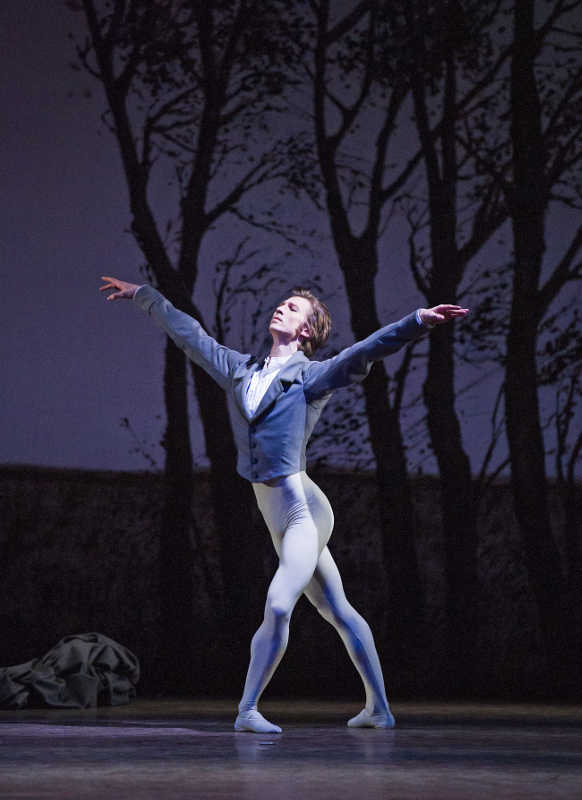 Of course, even if you agree that these mysteries of motivation are intriguing rather than annoying, it can't be denied that Onegin has other problems that prevent it being a truly great ballet. The first is that score: Kurt-Heinz Stolze may have done a sensitive job orchestrating a lot of lesser-known Tchaikovsky pieces into one whole, but it's still patchy and woefully devoid of the big melodies; a sad little Frankensteined monster next to Sleeping Beauty or The Nutcracker. There are only a few scenes where the music starts to transport: the haunting cello in Lensky's solo (Act II, scene II) and the sweeping melody introduced in the cello and taken up by all the strings in the final scene.
Of course, even if you agree that these mysteries of motivation are intriguing rather than annoying, it can't be denied that Onegin has other problems that prevent it being a truly great ballet. The first is that score: Kurt-Heinz Stolze may have done a sensitive job orchestrating a lot of lesser-known Tchaikovsky pieces into one whole, but it's still patchy and woefully devoid of the big melodies; a sad little Frankensteined monster next to Sleeping Beauty or The Nutcracker. There are only a few scenes where the music starts to transport: the haunting cello in Lensky's solo (Act II, scene II) and the sweeping melody introduced in the cello and taken up by all the strings in the final scene.
Construction-wise, there are issues too, even leaving aside the egregious appearance of the two women at the fatal duel scene. The first scene is turgid, lifted only if cheerful couple Lensky and Olga have some chemistry. Last night Vadim Muntagirov and Akane Takada, though both beautiful technicians, appeared barely to know each other; Takada's Olga found a spot of air somewhere over her lover's left shoulder consistently more interesting than his face.
But there are compensations – and proofs of Cranko's choreographic talent – too, like that absolutely tremendous solo for Lensky before the duel, surely one of the best "sad" male variations in the repertoire. Muntagirov is just the man for the poetic, idealistic Lensky (much the most likeable character in the ballet): he makes those elegant arabesques in the duel solo heartbreakingly beautiful, and seems made for Cranko's gestural language of yearning, backwards extended arms (pictured above left). Then there are quieter classical and formal pleasures aplenty, like some very nice parallelogram formations for the eight girls in the first scene or the Tatiana/Gremin pas de deux, to name but a few.
So all in all credit to Cranko, I'd say – and to the Royal Ballet. Onegin is not Swan Lake or Giselle, but it's interesting – at least as interesting as Manon, and it reminds us all of what we lost when Cranko died so prematurely.
- Onegin is at the Royal Opera House until 27 February

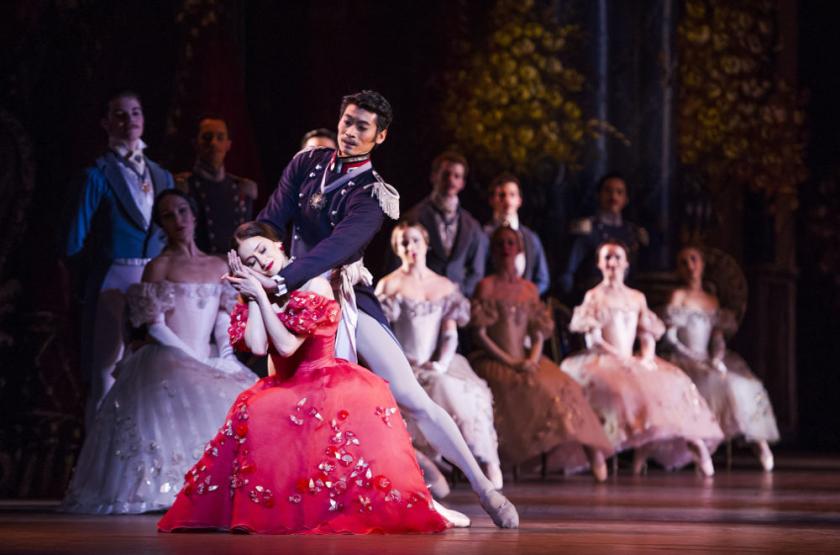


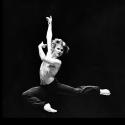

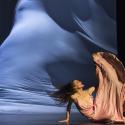
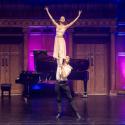

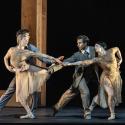
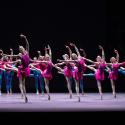
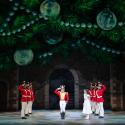
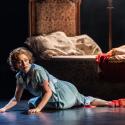

Add comment